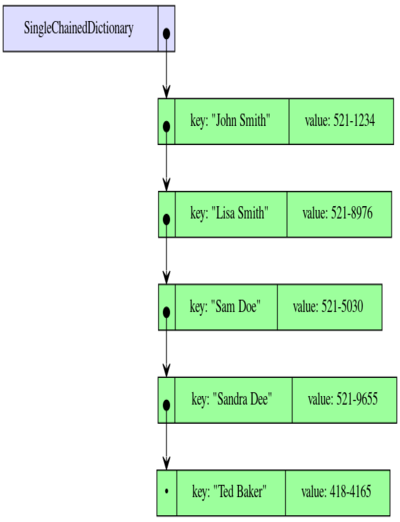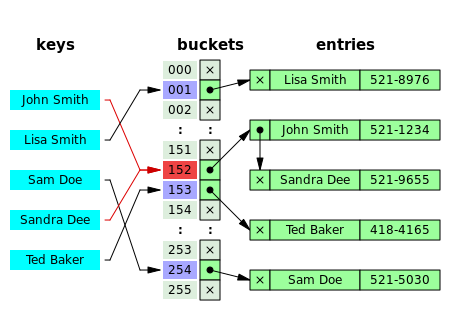Difference between revisions of "Chained Dictionary Assignment"
| Line 163: | Line 163: | ||
==structure HashedDictionary== | ==structure HashedDictionary== | ||
| + | [https://en.wikipedia.org/wiki/Hash_table Hash table] | ||
| + | |||
=== signature HASHED_DICTIONARY === | === signature HASHED_DICTIONARY === | ||
We can see that <code>signature HASHED_DICTIONARY</code> includes <code>DICTIONARY</code> and adds a <code>create</code> function which accepts the number of buckets to create along with a hash function. | We can see that <code>signature HASHED_DICTIONARY</code> includes <code>DICTIONARY</code> and adds a <code>create</code> function which accepts the number of buckets to create along with a hash function. | ||
Revision as of 20:12, 28 February 2022
Contents
Motivation
In this and the follow up Sorted Dictionary studio, you will build three implementations of a dictionary. Each will be a persistent, mutable data structure, so you can expect to use the ref feature of SML, either directly or via the mutable Array structure.
Background
SML
ref
fun get_value_at_reference(reference : 'a ref) : 'a =
!reference
fun set_value_at_reference(reference : 'a ref, next_value : 'a) : 'a =
let
val previous_value = !reference
val _ = reference := next_value
in
previous_value
end
(* alternate version
fun set_value_at_reference(reference : 'a ref, next_value : 'a) : 'a =
let
val previous_value = !reference
in
( reference := next_value
; previous_value )
end
*)
Mutable Array
HashTable
Code To Investigate
signature Dictionary
signature DICTIONARY = sig
type (''k,'v) dictionary
val get : ((''k,'v) dictionary *''k) -> 'v option
val put : ((''k,'v) dictionary *''k *'v) -> 'v option
val remove : ((''k,'v) dictionary *''k) -> 'v option
val entries : (''k,'v) dictionary -> (''k*'v) list
val keys : (''k,'v) dictionary -> ''k list
val values : (''k,'v) dictionary -> 'v list
end
get
Behaves much like java.util.Map<K,V>'s get(key) method except instead of returning null or the associated value, it returns an option.
put
Behaves much like java.util.Map<K,V>'s put(key,value) method except instead of returning null or the previously associated value, it returns an option.
remove
Behaves much like java.util.Map<K,V>'s remove(key) method except instead of returning null or the previously associated value, it returns an option.
entries
Behaves much like java.util.Map<K,V>'s entrySet() method.
keys
Behaves much like java.util.Map<K,V>'s keySet() method.
values
Behaves much like java.util.Map<K,V>'s values() method.
Code To Implement
functor HasEntriesFn
Each implementation of dictionary can reuse the same functions which given a list of entries produce the keys and values. functor HasEntriesFn accepts a signature parameter which defines an entries function to support keys and values functions.
functor HasEntriesFn (HasEntriesParameter : sig
type (''k,'v) dictionary
val entries : (''k,'v) dictionary -> (''k*'v) list
end) : HAS_ENTRIES = struct
keys
One of List's higher order functions can be useful here. Which one is it?
fun keys(dict : (''k,'v) dictionary) : ''k list =
raise Fail "NotYetImplemented"
values
One of List's higher order functions can be useful here. Which one is it?
fun values(dict : (''k,'v) dictionary) : 'v list =
raise Fail "NotYetImplemented"
functor HasChainingFn
One can anticipate that separate structures for SingleChainedDictionary and HashedDictionary have potential for code resuse. By parameterizing functor HasChainingFn with getChainOfEntriesForKey and setChainOfEntriesForKey we can implement get, put, and remove.
functor HasChainingFn (HasChainingParameter : sig
type (''k,'v) dictionary
val getChainOfEntriesForKey : ((''k,'v) dictionary * ''k) -> (''k*'v) list
val setChainOfEntriesForKey : ((''k,'v) dictionary * ''k * (''k*'v) list) -> unit
end) : HAS_CHAINING = struct
get
put
remove
structure SingleChainedDictionary
One can imagine the utility of having a simple Dictionary without the overhead of a HashTable. Perhaps, the number of anticipated entries is small. Perhaps, its performance is not critical. Maybe the client has a lot of tasks on his or her plate and simply does not feel like creating a custom hash function for their type. Whatever the reason, it seems like a reasonable implementation of Dictionary to provide.
signature SINGLE_CHAINED_DICTIONARY
We can see that signature SINGLE_CHAINED_DICTIONARY includes DICTIONARY and adds a create function.
structure SingleChainedDictionary :> SINGLE_CHAINED_DICTIONARY
signature SINGLE_CHAINED_DICTIONARY = sig include DICTIONARY
val create : unit -> (''k,'v) dictionary
end
structure TypeHolder
Change the definition of type (k,'v) dictionary to support SingleChainedDictionary.
structure TypeHolder = struct
(* TODO: replace unit with the type you decide upon *)
type (''k,'v) dictionary = unit
end
structure SingleChainHasEntries
structure SingleChainHasEntries = HasEntriesFn (struct
type (''k,'v) dictionary = (''k,'v) TypeHolder.dictionary
fun entries(dict : (''k,'v) dictionary) : (''k*'v) list =
raise Fail "NotYetImplemented"
end)
entries
Define the entries method so we can take advantage of the keys and values functions you implemented on functor HasEntriesFn.
structure SingleChainHasChaining
The two functions getChainOfEntriesForKey(dict, key) and setChainOfEntriesForKey(dict, key, nextEntries) used to parameterize functor>HasChainingFn are passed a key parameter. Since the chain will be the same for all keys, SingleChainedDictionary can ignore this key parameter (unlike HashedDictionary which will return different chains for different keys).
structure SingleChainHasChaining = HasChainingFn (struct
type (''k,'v) dictionary = (''k,'v) TypeHolder.dictionary
fun getChainOfAllEntries(dict : (''k,'v) dictionary) : (''k*'v) list =
raise Fail "NotYetImplemented"
fun setChainOfAllEntries(dict : (''k,'v) dictionary, nextEntries : (''k*'v) list) : unit =
raise Fail "NotYetImplemented"
fun getChainOfEntriesForKey(dict : (''k,'v) dictionary, key : ''k) : (''k*'v) list =
getChainOfAllEntries(dict)
fun setChainOfEntriesForKey(dict : (''k,'v) dictionary, key : ''k, nextEntries : (''k*'v) list) : unit =
setChainOfAllEntries(dict, nextEntries)
end)
getChainOfAllEntries
Note: this function is called from getChainOfEntriesForKey, dropping the unnecessary key paremeter.
setChainOfAllEntries
Note: this function is called from setChainOfEntriesForKey, dropping the unnecessary key paremeter.
create function
fun create() : (''k,'v) dictionary =
raise Fail "NotYetImplemented"
structure HashedDictionary
signature HASHED_DICTIONARY
We can see that signature HASHED_DICTIONARY includes DICTIONARY and adds a create function which accepts the number of buckets to create along with a hash function.
structure HashedDictionary :> HASHED_DICTIONARY
signature HASHED_DICTIONARY = sig include DICTIONARY
type ''k hash_function = ''k -> int
val create : (int * ''k hash_function) -> (''k,'v) dictionary
end
structure TypeHolder
Change the definition of type (k,'v) dictionary to support HashedDictionary.
structure TypeHolder = struct
(* TODO: replace unit with the type you decide upon *)
type (''k,'v) dictionary = unit
end
structure HashedHasEntries
structure HashedHasEntries = HasEntriesFn (struct
type (''k,'v) dictionary = (''k,'v) TypeHolder.dictionary
fun entries(dict : (''k,'v) dictionary) : (''k*'v) list =
raise Fail "NotYetImplemented"
end)
entries
Define the entries method so we can take advantage of the keys and values functions you implemented on functor HasEntriesFn.
structure HashedHasChaining
structure HashedHasChaining = HasChainingFn (struct
type (''k,'v) dictionary = (''k,'v) TypeHolder.dictionary
fun positive_remainder(v : int, n : int) : int =
let
val result = v mod n
in
if result >= 0 then result else result+n
end
fun getChainOfEntriesForKey(dict : (''k,'v) dictionary, key : ''k) : (''k*'v) list =
raise Fail "NotYetImplemented"
fun setChainOfEntriesForKey(dict : (''k,'v) dictionary, key : ''k, nextEntries : (''k*'v) list) : unit =
raise Fail "NotYetImplemented"
end)
getChainOfEntriesForKey
setChainOfEntriesForKey
create function
fun create(bucket_count_request : int, hash : ''k hash_function) : (''k,'v) dictionary =
raise Fail "NotYetImplemented"
Testing
file: sml run_chained_testing.sml
in folder: src/test/sml/dictionary/chained
Pledge, Acknowledgments, Citations
file:
exercise-chained-dictionary-pledge-acknowledgments-citations.txt
More info about the Honor Pledge

